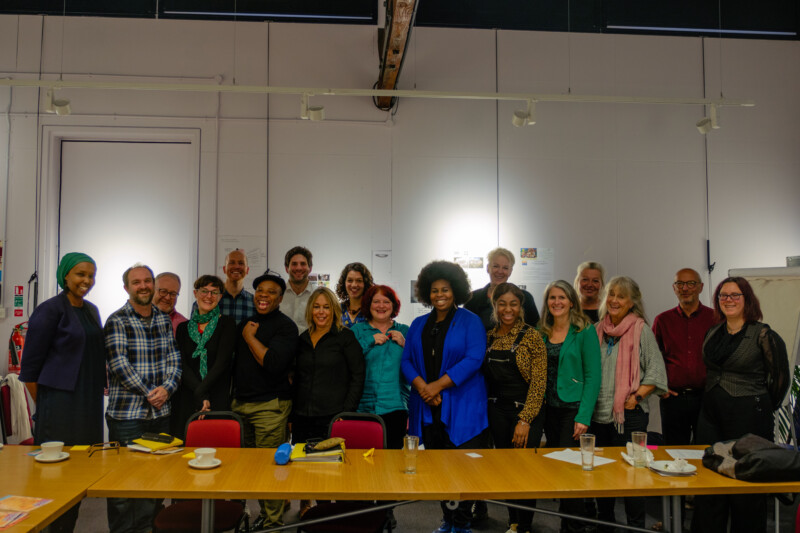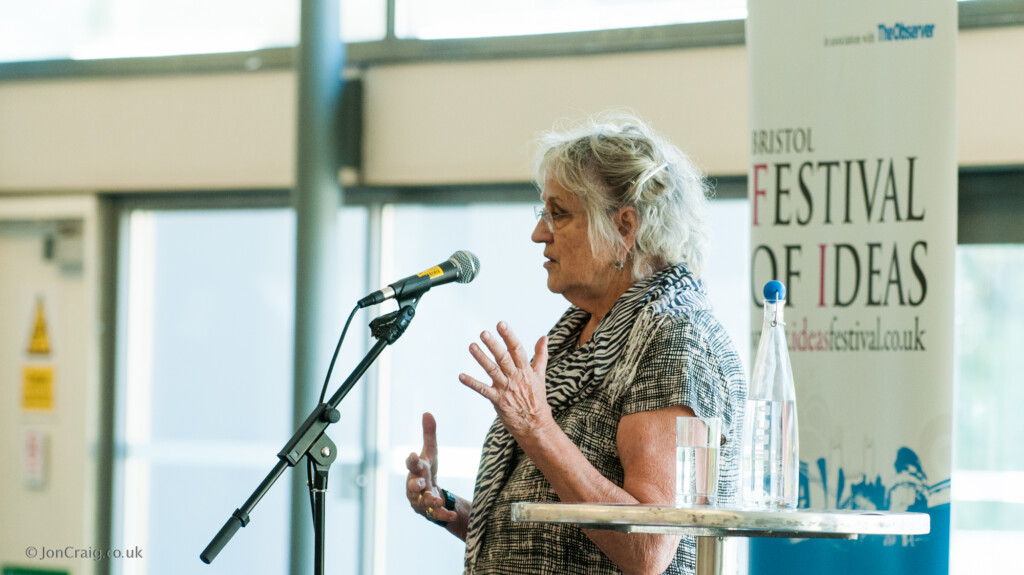A Friend, Mentor, Comrade: A Personal Reflection on the Festival of Ideas Edson Burton

Share this
Edson Burton (pictured here sixth from the left) was one of 13 people awarded social enterprise grants in a joint British Council/ Bristol Ideas project which ran for two years. Burton went to Chicago: ‘a life transforming research trip to…a city which has been central to my past and will be to my future work.’ (Evan Dawson)
Bristol Ideas worked with Edson Burton on projects about Malcolm X and James Baldwin, as well as the future of Bristol and other cities. Burton reflects here on his personal relationship to Bristol Ideas as an audience member and as a partner.
After the completion of my doctoral thesis, I found myself mashing together what is now fancifully termed a portfolio existence. In my case, the term was certainly a post-event rationalisation for a collision of happy accidents, meanders and aptitude. My wide-ranging thesis and teaching experience had placed me in good stead to comment on Bristol’s fractured race relations at a time when the city was markedly more schismed that it is today. I had developed, in parallel, a career writing poetry, audio and stage drama.
Despite some success on all fronts, I was still mentally making the transition from academic to public speaker, from ‘trying a ting’ to naming myself as artist. I had no career direction, no sense of pathway except a vague reasoning that I would raise the profile of my work. But I was fired with restless conviction that complex ideas should, must, be shared in forums outside the university. What was the point of consciousness-transforming knowledge if it remained on some publicly unavailable university catalogue? My passion noted, I called upon and looked for ways to contribute where I thought I could be useful.
My relationship with the culture sector was familiar and yet informal. This began to change in 2014 when, encouraged by Watershed Media Centre, I became a founder member of the Black curatorial group Come the Revolution. This in turn brought me into greater contact with Bristol Festival of Ideas.
At this point, I was mostly a consumer of the festival’s programme. Andrea Levy, Kenan Malik, Germaine Greer, Ekow Eshun, Gary Younge, AC Grayling and Colin Grant were just a few of the minds brought to the city by the festival’s team. At that point in my transition, they were proof that academics and creatives – dare one say ‘intellectuals’? – could speak to a wider public in a relatively more accessible mode. When invited to submit a creative response to the Festival of the Future City, a new initiative launched by Bristol Ideas in 2015, I felt flattered. I gulped when its director, Andrew Kelly, listed the authors with whom I would be sharing an evening presentation of our submissions. Shangri La was suddenly very close, very real. I asked myself if I was ready.

I am suspicious of reflections that become modern mantras – ‘set up to fail’; ‘you have to try twice as hard if you’re Black’ – but there is no smoke without fire. I had experienced, as a novice speaker and writer, the sense that I had one opportunity.
I asked myself if this was another such occasion, but I knew this invitation marked an important movement in my career. The pressure felt immense. The pressure is not always to do with those who confer the opportunity but how I, one of many culture sector outsiders, exhibit a debilitating sense of double consciousness. If I ‘fail’, I am proof that my place was secured by affirmative action, that I had been overhyped in the first place.
The moment of stepping up to the lectern felt far more loaded than any other step. It felt like the step. As I listened to my fellow writers, I sagged inside. My piece, a dystopian take on a future Bristol where human beings were reduced to hypermonitored bots, was by far the longest that night and far too dense with ideas, at least so I thought. I can’t recall how well I recited. Did I breathe? Did I pause? I didn’t think I was abysmal, but it wasn’t my best moment. It would be entirely understandable, I reasoned, for this to be my only invitation as a speaker to a Festival of Ideas event. I was genuinely surprised, therefore, when only a few weeks later I was back in the fray discussing plans and projects with the team.
In fact, the following year, I wrote perhaps my most provocative essay, ‘A Reply to the N Question’, as part of a series of Festival of Ideas events commemorating the work of African American Pulitzer Prize-winner James Baldwin. I returned to writing about Baldwin in 2023 as part of a centenary programme. In the intervening years, I have written articles, chaired panels and been a guest panellist as part of the festival’s programmes.
My debt to Bristol Ideas cannot be covered in one article. It has given me the platform to share ideas outside the academy using the personal essay, a form which first drew me to Baldwin. My relationship with Writers Mosaic and its community of writers would not have occurred without Bristol Ideas. In conjunction with the British Council, Bristol Ideas funded my life-transforming research trip to Chicago, a city which has been central to my past and will be to my future work.
But the debt I owe most to Bristol Ideas is trust. It is a shock to be nurtured if you are – by race, class or education – a culture sector outsider. Bristol Ideas trusted in my potential. I could be awkward, miss the mark, have an off day or score a blinder. Reviewing past programmes, one witnesses Bristol Ideas’ journey. Through commitment and consistency, it has formed relationships in its fractured home city that are best described as extraordinary. I worry that rebuilding such networks may not be possible without Bristol Ideas. I shed a tear when I discovered that Bristol Ideas was coming to an end. I have lost a partner for my work and lost colleagues who have been friends, mentors and comrades. The city has also lost a voice.
Edson Burton is a writer, poet, academic and compere. His projects include a study of Bristol’s Old Market ward, Vice and Virtue and Black South West Network’s Race Through the Generations. He has also written on cinema as well as James Baldwin for Bristol Ideas.
This essay is taken from Our Project Was the City: Bristol Ideas 1992-2024, published May 2024.
